The Cambridge History of China. Vol. 12: Republican China, 1912-1949, Part 1
Подождите немного. Документ загружается.

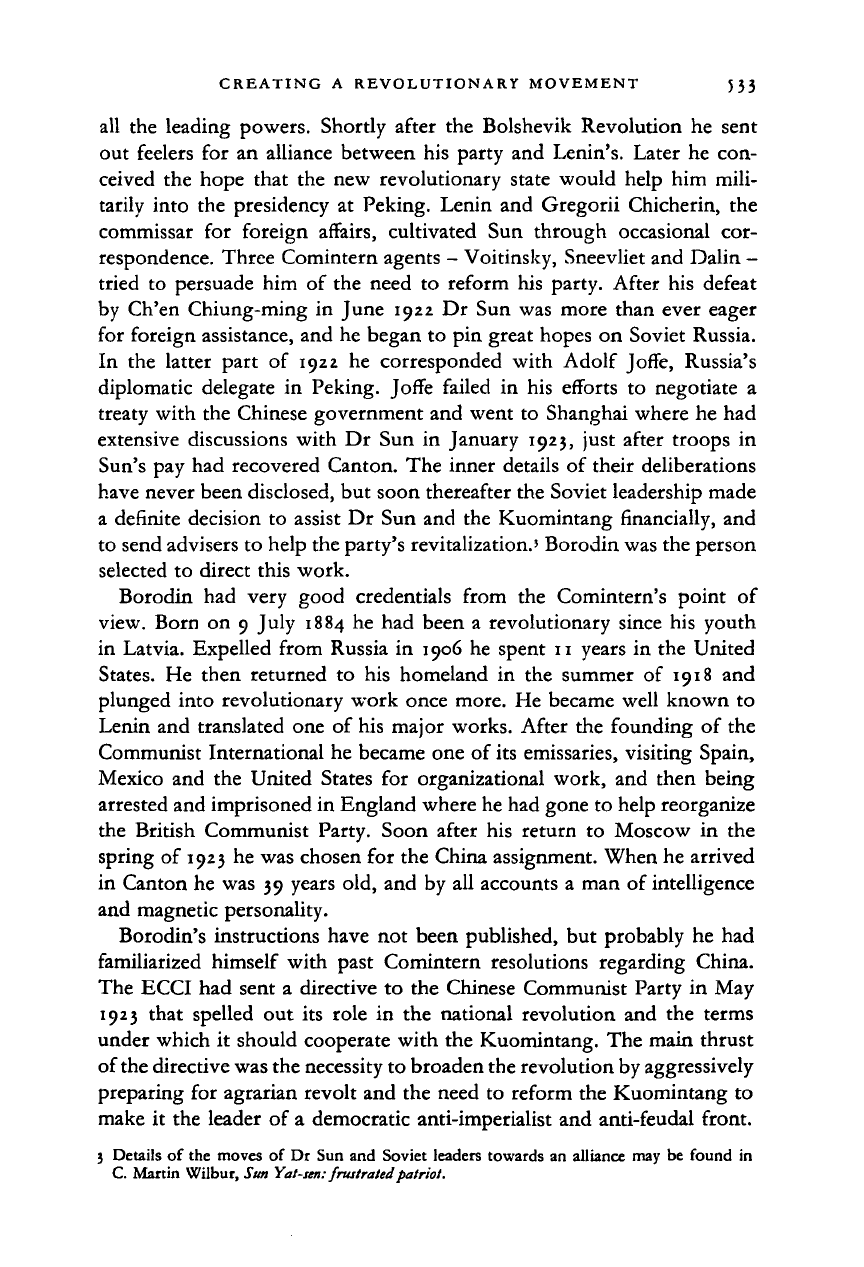
CREATING A REVOLUTIONARY MOVEMENT 533
all
the
leading powers. Shortly after
the
Bolshevik Revolution
he
sent
out feelers
for an
alliance between
his
party
and
Lenin's. Later
he con-
ceived
the
hope that
the new
revolutionary state would help
him
mili-
tarily into
the
presidency
at
Peking. Lenin
and
Gregorii Chicherin,
the
commissar
for
foreign affairs, cultivated
Sun
through occasional
cor-
respondence. Three Comintern agents
-
Voitinsky, Sneevliet and Dalin
-
tried
to
persuade
him of the
need
to
reform
his
party. After
his
defeat
by Ch'en Chiung-ming
in
June 1922
Dr Sun was
more than ever eager
for foreign assistance,
and he
began
to pin
great hopes
on
Soviet Russia.
In
the
latter part
of 1922 he
corresponded with Adolf Joffe, Russia's
diplomatic delegate
in
Peking. Joffe failed
in his
efforts
to
negotiate
a
treaty with
the
Chinese government
and
went
to
Shanghai where
he had
extensive discussions with
Dr Sun in
January 1923, just after troops
in
Sun's
pay had
recovered Canton.
The
inner details
of
their deliberations
have never been disclosed,
but
soon thereafter the Soviet leadership made
a definite decision
to
assist
Dr Sun and the
Kuomintang financially,
and
to send advisers
to
help the party's revitalization.' Borodin was the person
selected
to
direct this work.
Borodin
had
very good credentials from
the
Comintern's point
of
view. Born
on 9
July 1884
he had
been
a
revolutionary since
his
youth
in Latvia. Expelled from Russia
in
1906
he
spent 11 years
in the
United
States.
He
then returned
to his
homeland
in the
summer
of 1918 and
plunged into revolutionary work once more.
He
became well known
to
Lenin
and
translated
one of
his major works. After
the
founding
of the
Communist International
he
became
one of
its emissaries, visiting Spain,
Mexico
and the
United States
for
organizational work,
and
then being
arrested and imprisoned in England where he had gone
to
help reorganize
the British Communist Party. Soon after
his
return
to
Moscow
in the
spring
of
1923
he
was chosen
for
the China assignment. When
he
arrived
in Canton
he was 39
years
old, and by all
accounts
a
man
of
intelligence
and magnetic personality.
Borodin's instructions have
not
been published,
but
probably
he had
familiarized himself with past Comintern resolutions regarding China.
The ECCI
had
sent
a
directive
to the
Chinese Communist Party
in
May
1923 that spelled
out its
role
in the
national revolution
and the
terms
under which
it
should cooperate with
the
Kuomintang.
The
main thrust
of the directive was the necessity to broaden the revolution by aggressively
preparing
for
agrarian revolt
and the
need
to
reform
the
Kuomintang
to
make
it the
leader
of a
democratic anti-imperialist
and
anti-feudal front.
5 Details
of
the moves
of Dr Sun and
Soviet leaders towards
an
alliance
may be
found
in
C.
Martin Wilbur, Sun Yat-tcn: frustrated patriot.
Cambridge Histories Online © Cambridge University Press, 2008

534 THE NATIONALIST REVOLUTION, I923-8
The 'basic demand'
of
the Kuomintang must be its unconditional support
of
the
workers' movement
in
China.
The
Kuomintang should draw
the
broadest possible masses into the struggle against the northern militarists
and foreign imperialism.
The
Communist Party must continuously
in-
fluence the Kuomintang
in
favour
of
agrarian revolution, insisting
on
confiscation
of
land
in
favour
of the
poorest peasantry;
and
it
must
do
whatever possible
to
prevent alliances between
Sun
Yat-sen
and
the
militarists.
It
must demand
the
earliest possible convocation
of a Kuo-
mintang convention
to
focus upon creation of a broad national democratic
front,
and
it
must insist
on the
abrogation
of
treaties
and
agreements
imposed upon China
by
the
imperialist powers.* Borodin's objectives
probably were similar; this
is
clearly evident
in
his
early activities
in
Canton.
Rejuvenating
the Kuomintang
Borodin
met
frequently with
Sun
Yat-sen
to
discuss Kuomintang
pro-
blems
and
offer advice
on
the coming revolution.
He
also
met
with local
communists
to
reassure them
of
his intention
in
the long run
to
work
for
the strengthening
of
the Communist Party.
5
On
25 October
Dr Sun ap-
pointed
a
Provisional Executive Committee
to
draft
a
new
party
pro-
gramme
and
constitution
and
to
prepare
for a
national congress.
He
appointed Borodin
its
adviser. Borodin drafted
a
new
constitution
for
the Kuomintang, modelling
its
structure
on
that
of
the
Russian
Com-
munist Party/Bolshevik. His draft, which is similar to the one later adopted,
described five levels
of
organization
-
national, provincial, county, district
and sub-district.
An
annual National Congress
of
Representatives was
to
elect
a
Central Executive Committee (CEC)
and
a
Central Supervisory
Committee (CSC). Between congresses
the CEC
would
run the
party,
appoint
its
chief officers, manage finances,
and
direct
its
organs
and all
lower executive committees. Kuomintang members were
all to be
under
strict party discipline. Those having membership
in
other organizations
such
as
labour unions, merchants associations, provincial assemblies
or
4 Xenia Joukoff Eudin
and
Robert
C.
North, Soviet Russia and the East,
1920—1927:
a
docu-
mentary survey, 344-6. Jane Degras,
The
Communist International, 1919—194): documents
se-
lected
and
edited
by Jane Degras, 2. 25-6, extracts.
5 Borodin's reports
on his
early meetings
are
found
in N.
Mitarevsky, World-aide Soviet
plots,
as
disclosed
by hitherto
unpublished documents
seized
in the
USSR
embassy
in
Peking, 130-8.
This
is a
hostile source,
but
the documents prove genuine when tested by other historical
evidence.
The
best scholarly account
of
Borodin's life
and his
work
in
China until
Dr
Sun's death
is
Lydia Holubnychy, Michael Borodin
and the
Chinese revolution, if 23-192/.
A biography
of
Borodin covering his entire life
is
Dan N. Jacobs,
Borodin:
Stalin's
man
in
China.
Cambridge Histories Online © Cambridge University Press, 2008
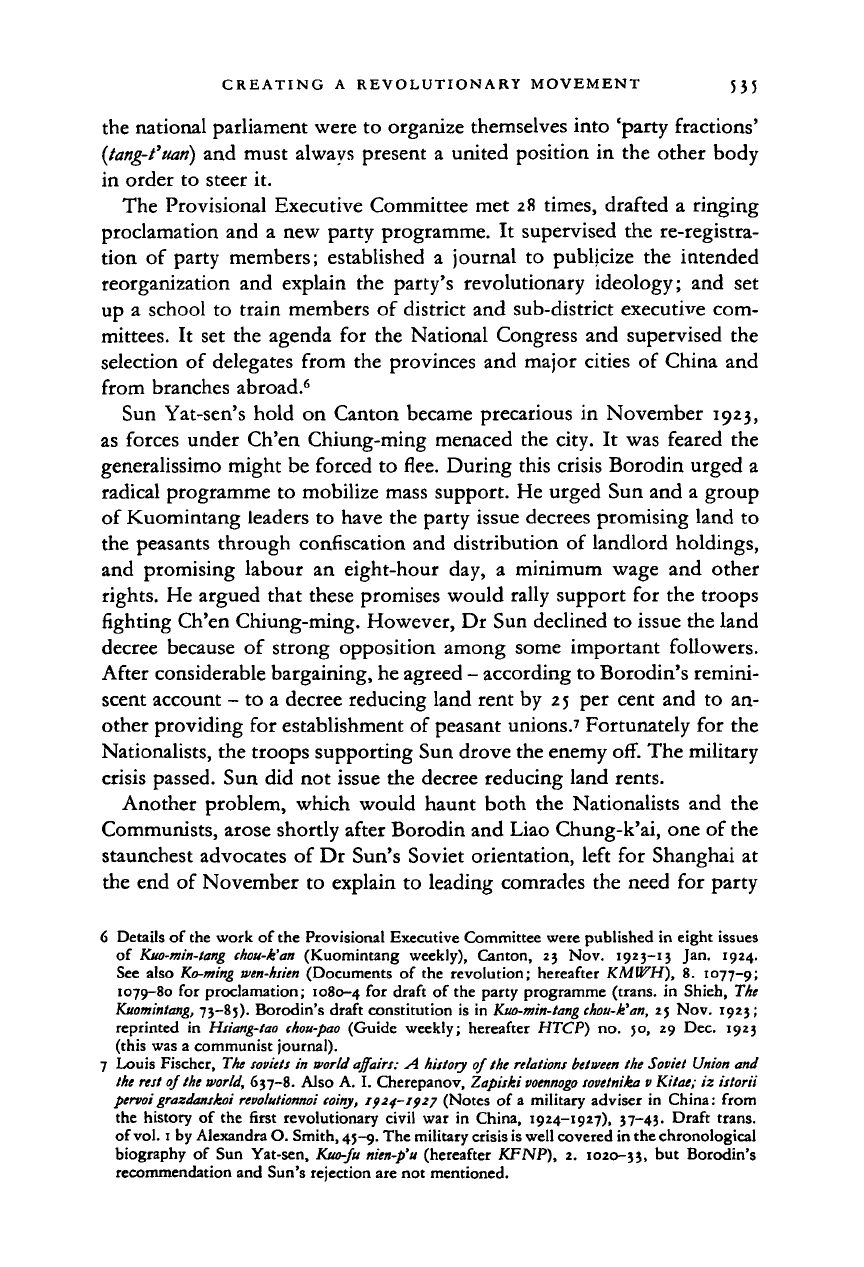
CREATING A REVOLUTIONARY MOVEMENT 535
the national parliament were to organize themselves into 'party fractions'
(Jang-t'uan)
and must always present a united position in the other body
in order to steer it.
The Provisional Executive Committee met 28 times, drafted a ringing
proclamation and a new party programme. It supervised the re-registra-
tion of party members; established a journal to publicize the intended
reorganization and explain the party's revolutionary ideology; and set
up a school to train members of district and sub-district executive com-
mittees. It set the agenda for the National Congress and supervised the
selection of delegates from the provinces and major cities of China and
from branches abroad.
6
Sun Yat-sen's hold on Canton became precarious in November 1923,
as forces under Ch'en Chiung-ming menaced the city. It was feared the
generalissimo might be forced to flee. During this crisis Borodin urged a
radical programme to mobilize mass support. He urged Sun and a group
of Kuomintang leaders to have the party issue decrees promising land to
the peasants through confiscation and distribution of landlord holdings,
and promising labour an eight-hour day, a minimum wage and other
rights.
He argued that these promises would rally support for the troops
fighting Ch'en Chiung-ming. However, Dr Sun declined to issue the land
decree because of strong opposition among some important followers.
After considerable bargaining, he agreed - according to Borodin's remini-
scent account - to a decree reducing land rent by
2 5
per cent and to an-
other providing for establishment of peasant unions.
7
Fortunately for the
Nationalists, the troops supporting Sun drove the enemy off. The military
crisis passed. Sun did not issue the decree reducing land rents.
Another problem, which would haunt both the Nationalists and the
Communists, arose shortly after Borodin and Liao Chung-k'ai, one of the
staunchest advocates of Dr Sun's Soviet orientation, left for Shanghai at
the end of November to explain to leading comrades the need for party
6 Details of the work of the Provisional Executive Committee were published in eight issues
of
Kuo-min-tang chou-k'an
(Kuomintang weekly), Canton, 23 Nov. 1923-13 Jan. 1924.
See also Ko-ming
wen-hsien
(Documents of the revolution; hereafter KMW'H), 8. 1077-9;
1079-80 for proclamation; 1080-4 f°
r
draft of the party programme (trans, in Shieh, The
Kuomintang,
73—85). Borodin's draft constitution is in
Kuo-min-tang
chou-k'an,
2$ Nov. 1923;
reprinted in Hsiang-tao
chou-pao
(Guide weekly; hereafter HTCP) no. 50, 29 Dec. 1923
(this was a communist journal).
7 Louis Fischer,
The Soviets
in world
affairs:
A history of
the relations between
the Soviet
Union
and
the rest of
the
world,
637-8. Also A. I. Cherepanov, Zapiski
voennogo sovetnika
v Kitae; iz istorii
pervoigrazdanskoi
revolutionnoi
coiny,
1924-1927 (Notes of a military adviser in China: from
the history of the first revolutionary civil war in China, 1924-1927), 37-43. Draft trans,
of vol.
1
by Alexandra O. Smith, 45-9. The military crisis is well covered in the chronological
biography of Sun Yat-sen, Kuo-fu
nien-p'u
(hereafter KFNP), 2. 1020-33, but Borodin's
recommendation and Sun's rejection are not mentioned.
Cambridge Histories Online © Cambridge University Press, 2008
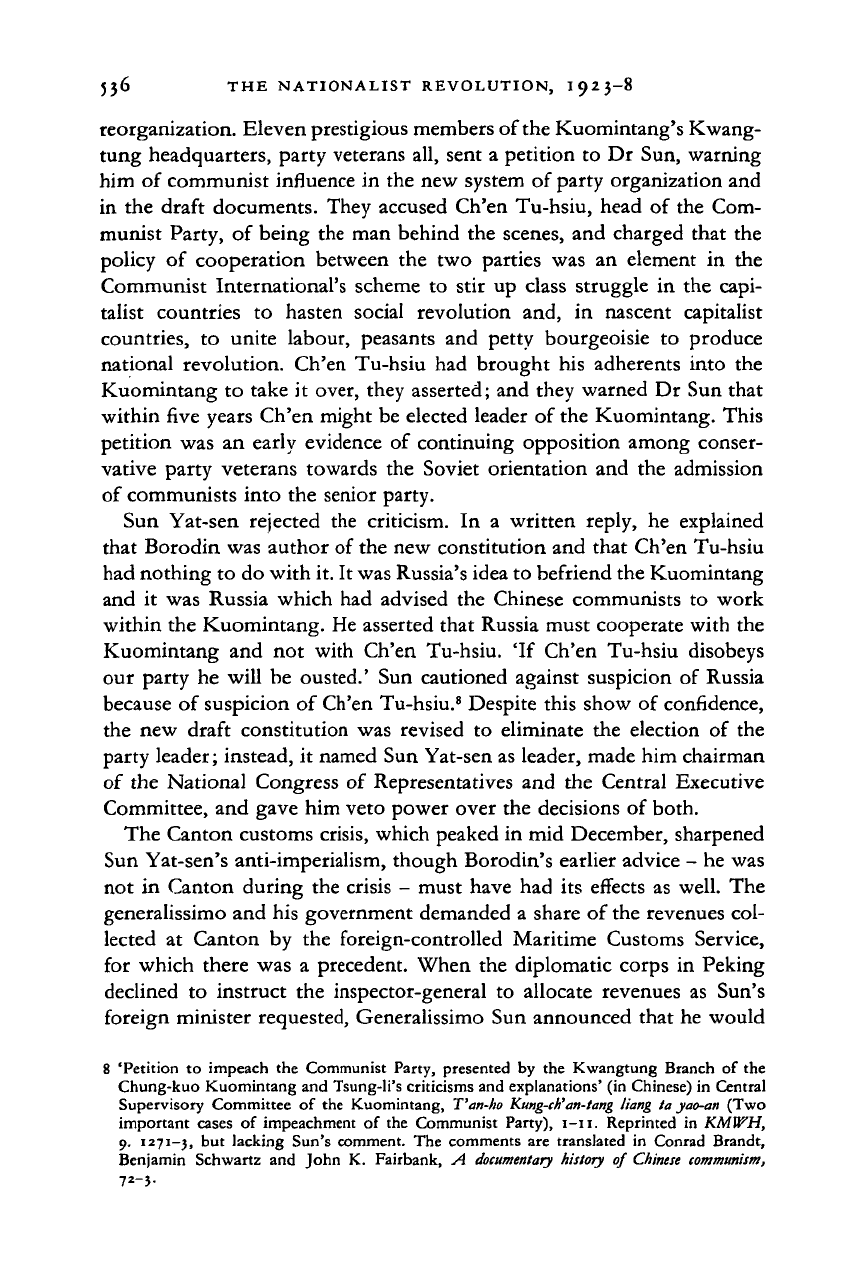
536 THE NATIONALIST REVOLUTION, I923-8
reorganization. Eleven prestigious members of the Kuomintang's Kwang-
tung headquarters, party veterans all, sent
a
petition
to Dr
Sun, warning
him
of
communist influence
in
the new system
of
party organization and
in
the
draft documents. They accused Ch'en Tu-hsiu, head
of
the Com-
munist Party,
of
being
the
man behind
the
scenes,
and
charged that
the
policy
of
cooperation between
the two
parties
was an
element
in the
Communist International's scheme
to
stir
up
class struggle
in the
capi-
talist countries
to
hasten social revolution
and, in
nascent capitalist
countries,
to
unite labour, peasants
and
petty bourgeoisie
to
produce
national revolution. Ch'en Tu-hsiu
had
brought
his
adherents into
the
Kuomintang
to
take
it
over, they asserted;
and
they warned
Dr
Sun that
within five years Ch'en might
be
elected leader
of
the Kuomintang. This
petition
was an
early evidence
of
continuing opposition among conser-
vative party veterans towards
the
Soviet orientation
and the
admission
of communists into
the
senior party.
Sun Yat-sen rejected
the
criticism.
In a
written reply,
he
explained
that Borodin was author
of
the new constitution and that Ch'en Tu-hsiu
had nothing
to
do with it. It was Russia's idea to befriend the Kuomintang
and
it was
Russia which
had
advised
the
Chinese communists
to
work
within the Kuomintang. He asserted that Russia must cooperate with
the
Kuomintang
and not
with Ch'en Tu-hsiu.
'If
Ch'en Tu-hsiu disobeys
our party
he
will
be
ousted.'
Sun
cautioned against suspicion
of
Russia
because
of
suspicion
of
Ch'en Tu-hsiu.
8
Despite this show
of
confidence,
the
new
draft constitution
was
revised
to
eliminate
the
election
of the
party leader; instead,
it
named Sun Yat-sen as leader, made him chairman
of
the
National Congress
of
Representatives
and the
Central Executive
Committee,
and
gave him veto power over
the
decisions
of
both.
The Canton customs crisis, which peaked
in
mid December, sharpened
Sun Yat-sen's anti-imperialism, though Borodin's earlier advice
- he
was
not
in
Canton during
the
crisis
-
must have
had its
effects
as
well.
The
generalissimo and his government demanded
a
share
of
the revenues col-
lected
at
Canton
by the
foreign-controlled Maritime Customs Service,
for which there
was a
precedent. When
the
diplomatic corps
in
Peking
declined
to
instruct
the
inspector-general
to
allocate revenues
as
Sun's
foreign minister requested, Generalissimo Sun announced that
he
would
8 'Petition
to
impeach
the
Communist Party, presented
by the
Kwangtung Branch
of the
Chung-kuo Kuomintang and Tsung-li's criticisms and explanations'
(in
Chinese)
in
Central
Supervisory Committee
of the
Kuomintang,
T'an-ho
Kung-ch'an-tang Hang
ta
yao-an
(Two
important cases
of
impeachment
of the
Communist Party),
1-11.
Reprinted
in
KMWH,
9. 1271-3,
but
lacking Sun's comment.
The
comments
are
translated
in
Conrad Brandt,
Benjamin Schwartz
and
John
K.
Fairbank,
A
documentary history
of
Chinese
communism,
72-3-
Cambridge Histories Online © Cambridge University Press, 2008
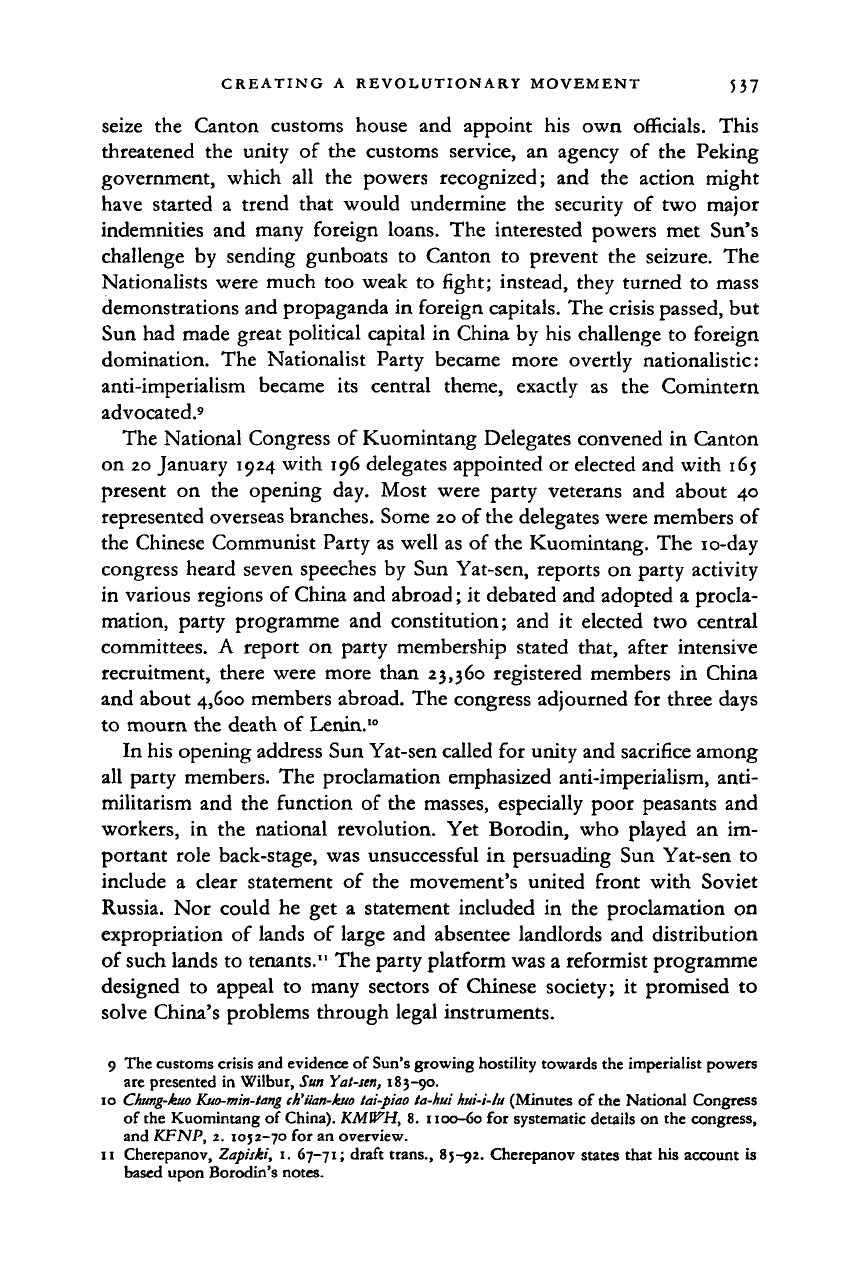
CREATING A REVOLUTIONARY MOVEMENT 537
seize the Canton customs house and appoint his own officials. This
threatened the unity of the customs service, an agency of the Peking
government, which all the powers recognized; and the action might
have started a trend that would undermine the security of two major
indemnities and many foreign loans. The interested powers met Sun's
challenge by sending gunboats to Canton to prevent the seizure. The
Nationalists were much too weak to fight; instead, they turned to mass
demonstrations and propaganda in foreign capitals. The crisis passed, but
Sun had made great political capital in China by his challenge to foreign
domination. The Nationalist Party became more overtly nationalistic:
anti-imperialism became its central theme, exactly as the Comintern
advocated.
9
The National Congress of Kuomintang Delegates convened in Canton
on 20 January 1924 with 196 delegates appointed or elected and with 165
present on the opening day. Most were party veterans and about 40
represented overseas branches. Some 20 of the delegates were members of
the Chinese Communist Party as well as of the Kuomintang. The 10-day
congress heard seven speeches by Sun Yat-sen, reports on party activity
in various regions of China and abroad; it debated and adopted a procla-
mation, party programme and constitution; and it elected two central
committees. A report on party membership stated that, after intensive
recruitment, there were more than 23,360 registered members in China
and about 4,600 members abroad. The congress adjourned for three days
to mourn the death of Lenin.
10
In his opening address Sun Yat-sen called for unity and sacrifice among
all party members. The proclamation emphasized anti-imperialism, anti-
militarism and the function of the masses, especially poor peasants and
workers, in the national revolution. Yet Borodin, who played an im-
portant role back-stage, was unsuccessful in persuading Sun Yat-sen to
include a clear statement of the movement's united front with Soviet
Russia. Nor could he get a statement included in the proclamation on
expropriation of lands of large and absentee landlords and distribution
of such lands to tenants." The party platform was a reformist programme
designed to appeal to many sectors of Chinese society; it promised to
solve China's problems through legal instruments.
9 The customs crisis and evidence of Sun's growing hostility towards the imperialist powers
are presented in Wilbur, Sun Yat-sen, 183-90.
10
Chung-kuo Kuo-min-tang ch'uan-kuo
tai-piao ta-hui
hui-i-lu
(Minutes of the National Congress
of the Kuomintang of China).
KMWH,
8. 1100-60 for systematic details on the congress,
and KFNP, 2. 1052-70 for an overview.
11 Cherepanov, Zapiski, 1.
67-71;
draft trans., 85-92. Cherepanov states that his account is
based upon Borodin's notes.
Cambridge Histories Online © Cambridge University Press, 2008
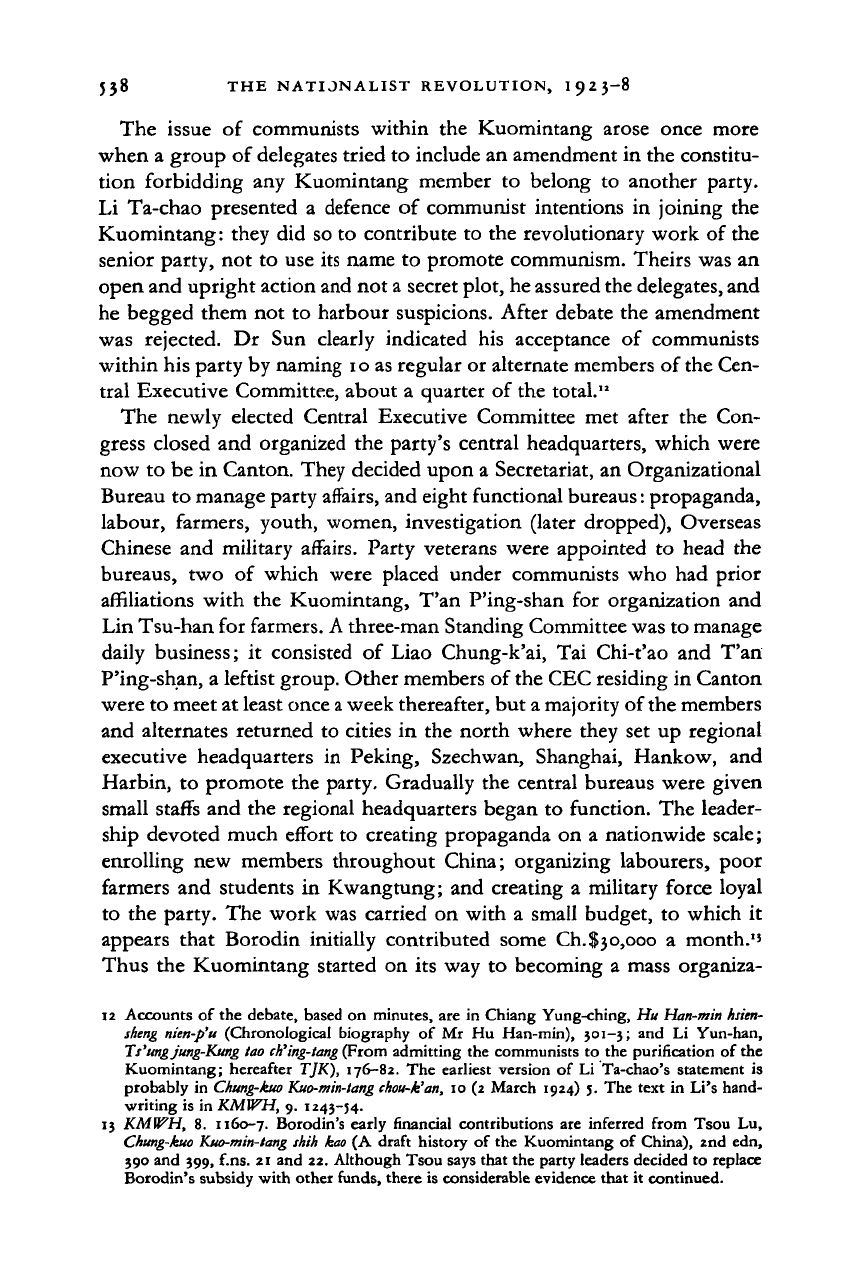
538 THE NATIONALIST REVOLUTION, I 9 2 3-8
The issue of communists within the Kuomintang arose once more
when a group of delegates tried to include an amendment in the constitu-
tion forbidding any Kuomintang member to belong to another party.
Li Ta-chao presented a defence of communist intentions in joining the
Kuomintang: they did so to contribute to the revolutionary work of the
senior party, not to use its name to promote communism. Theirs was an
open and upright action and not a secret plot, he assured the delegates, and
he begged them not to harbour suspicions. After debate the amendment
was rejected. Dr Sun clearly indicated his acceptance of communists
within his party by naming 10 as regular or alternate members of the Cen-
tral Executive Committee, about a quarter of the total.
12
The newly elected Central Executive Committee met after the Con-
gress closed and organized the party's central headquarters, which were
now to be in Canton. They decided upon a Secretariat, an Organizational
Bureau to manage party affairs, and eight functional bureaus: propaganda,
labour, farmers, youth, women, investigation (later dropped), Overseas
Chinese and military affairs. Party veterans were appointed to head the
bureaus, two of which were placed under communists who had prior
affiliations with the Kuomintang, T'an P'ing-shan for organization and
Lin Tsu-han for farmers.
A
three-man Standing Committee was to manage
daily business; it consisted of Liao Chung-k'ai, Tai Chi-t'ao and T'an
P'ing-shan, a leftist group. Other members of the CEC residing in Canton
were to meet at least once
a
week thereafter, but a majority of the members
and alternates returned to cities in the north where they set up regional
executive headquarters in Peking, Szechwan, Shanghai, Hankow, and
Harbin, to promote the party. Gradually the central bureaus were given
small staffs and the regional headquarters began to function. The leader-
ship devoted much effort to creating propaganda on a nationwide scale;
enrolling new members throughout China; organizing labourers, poor
farmers and students in Kwangtung; and creating a military force loyal
to the party. The work was carried on with a small budget, to which it
appears that Borodin initially contributed some Ch. $3 0,000 a month.
1
'
Thus the Kuomintang started on its way to becoming a mass organiza-
12 Accounts of the debate, based on minutes, are in Chiang Yung-ching, Hu
Han-min
hsien-
sheng nien-p'u
(Chronological biography of Mr Hu Han-min),
$01-3;
and Li Yun-han,
Ts'tmg
jung-Kung tao ch'ing-tang
(From admitting the communists to the purification of the
Kuomintang; hereafter TJK), 176-82. The earliest version of Li Ta-chao's statement is
probably in
Chung-kuo Kuo-min-tang
chou-k'an,
10 (2 March 1924) 5. The text in Li's hand-
writing is in
KMWH,
9. 1243-54.
13
KMWH,
8. 1160-7. Borodin's early financial contributions are inferred from Tsou Lu,
Chung-kuo Kuo-min-tang shih
km (A draft history of the Kuomintang of China), 2nd edn,
390 and 399, f.ns. 21 and 22. Although Tsou says that the party leaders decided to replace
Borodin's subsidy with other funds, there is considerable evidence that it continued.
Cambridge Histories Online © Cambridge University Press, 2008

CREATING A REVOLUTIONARY MOVEMENT 539
tion with a strong leadership structure, a revolutionary ideology, and a
plan for the ultimate seizure of political power in China.
Creating a
revolutionary
military force
Soviet military advisers who arrived with Borodin or joined him in
Canton were appalled at the condition of the military forces supporting
Sun Yat-sen in the winter of 1923-4. Most of the troops were poorly
trained, badly equipped and led by incompetent officers, in the Russians'
opinion. Only Sun's bodyguard of 15 0-200 men were completely loyal to
him; the rest were the private armies of their commanders and their
fighting value was nil, it seemed to the Russians. This situation had to be
remedied if the Nationalists were to launch a campaign to unify the
country with any hope of achieving military success. Necessary reforms
would be the centralization of revenue collection, arms procurement, and
pay of military units; standardized military training, and the indoctrina-
tion of officers and men in a common revolutionary ideology; and the
creation of
a
unified and effective command structure. These were difficult
measures to carry out, given the government's slender resources and the
fact that unification of finances and command ran against the particularistic
interests of the senior officers upon whom the government depended for
its territorial base. The local arsenal, when it operated, could producd
only enough rifles and machine guns in a year to equip one, or at most
two,
full-strength divisions, but the arsenal was run like a commercial
enterprise: it sold its arms to any general who could pay for them. Impor-
tation of arms was difficult, though not impossible, because of an interna-
tional arms embargo which the Maritime Customs Service attempted to
enforce.
Dr Sun tried to strengthen his authority and bring his commanders
together by appointing them to important positions within the Kuomin-
tang. He chose Generals T'an Yen-k'ai and Yang Hsi-min, the titular
commanders of the Hunan and Yunnan forces in Kwangtung, to be
members of the Central Executive Committee. As reserve members of
the Central Supervisory Committee he nominated General Hsu Ch'ung-
chih, in titular command of Kwangtung Army units which supported Sun,
and Gernerals Liu Chen-huan and Fan Chung-hsiu, who commanded
small Kwangsi and Honan forces. In March the CEC delegated them,
together with Generals Chu P'ei-te, who led a separate Yunnan force,
and Lu Shih-t'i, a Szechwanese commanding a mixed corps, to organize
party cells in their units. Periodically the generalissimo tried to persuade
the various commanders to allow his appointees to collect the taxes and
Cambridge Histories Online © Cambridge University Press, 2008
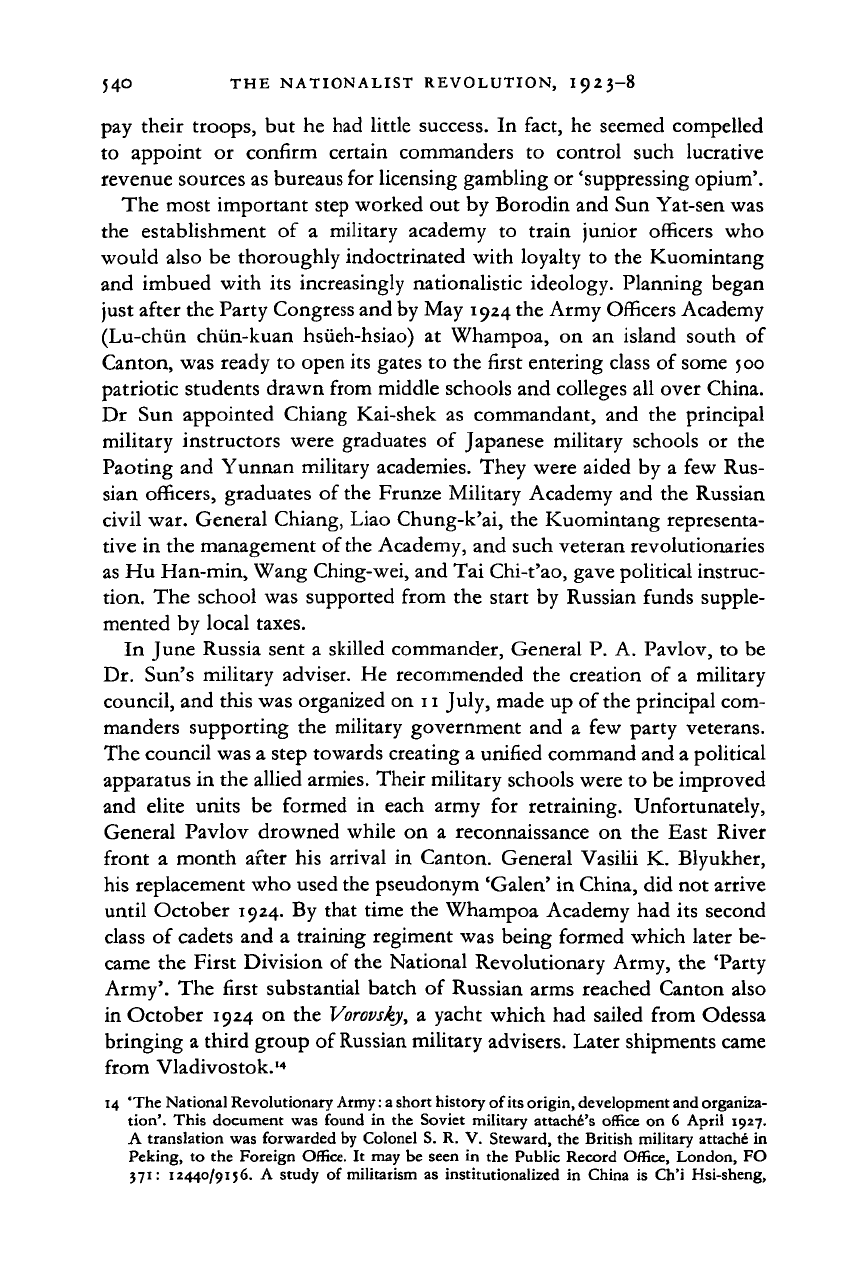
540 THE NATIONALIST REVOLUTION, I923-8
pay their troops,
but he had
little success.
In
fact,
he
seemed compelled
to appoint
or
confirm certain commanders
to
control such lucrative
revenue sources as bureaus for licensing gambling
or
'suppressing opium'.
The most important step worked
out by
Borodin and Sun Yat-sen was
the establishment
of a
military academy
to
train junior officers
who
would also
be
thoroughly indoctrinated with loyalty
to the
Kuomintang
and imbued with
its
increasingly nationalistic ideology. Planning began
just after the Party Congress and by May 1924 the Army Officers Academy
(Lu-chiin chiin-kuan hsiieh-hsiao)
at
Whampoa,
on an
island south
of
Canton, was ready
to
open its gates
to
the first entering class
of
some
500
patriotic students drawn from middle schools and colleges all over China.
Dr
Sun
appointed Chiang Kai-shek
as
commandant,
and the
principal
military instructors were graduates
of
Japanese military schools
or the
Paoting
and
Yunnan military academies. They were aided
by a few
Rus-
sian officers, graduates
of
the Frunze Military Academy
and the
Russian
civil war. General Chiang, Liao Chung-k'ai,
the
Kuomintang representa-
tive
in
the management of
the
Academy, and such veteran revolutionaries
as
Hu
Han-min, Wang Ching-wei, and Tai Chi-t'ao, gave political instruc-
tion.
The
school was supported from
the
start
by
Russian funds supple-
mented
by
local taxes.
In June Russia sent
a
skilled commander, General
P. A.
Pavlov,
to be
Dr. Sun's military adviser.
He
recommended
the
creation
of a
military
council, and this was organized
on
11 July, made up
of
the principal com-
manders supporting
the
military government
and a few
party veterans.
The council was
a
step towards creating
a
unified command and
a
political
apparatus
in
the allied armies. Their military schools were
to
be improved
and elite units
be
formed
in
each army
for
retraining. Unfortunately,
General Pavlov drowned while
on a
reconnaissance
on the
East River
front
a
month after
his
arrival
in
Canton. General Vasilii
K.
Blyukher,
his replacement who used the pseudonym 'Galen'
in
China, did not arrive
until October 1924.
By
that time
the
Whampoa Academy
had its
second
class
of
cadets
and a
training regiment was being formed which later be-
came
the
First Division
of
the National Revolutionary Army,
the
'Party
Army'.
The
first substantial batch
of
Russian arms reached Canton also
in October 1924
on the
Vorovsky,
a
yacht which
had
sailed from Odessa
bringing
a
third group
of
Russian military advisers. Later shipments came
from Vladivostok.
14
14 'The National Revolutionary
Army:
a short history of its origin, development and organiza-
tion'. This document
was
found
in the
Soviet military attache's office
on 6
April 1927.
A translation was forwarded by Colonel
S. R. V.
Steward,
the
British military attache
in
Peking,
to the
Foreign Office.
It
may
be
seen
in the
Public Record Office, London,
FO
371:
12440/9156.
A
study
of
militarism
as
institutionalized
in
China
is Ch'i
Hsi-sheng,
Cambridge Histories Online © Cambridge University Press, 2008
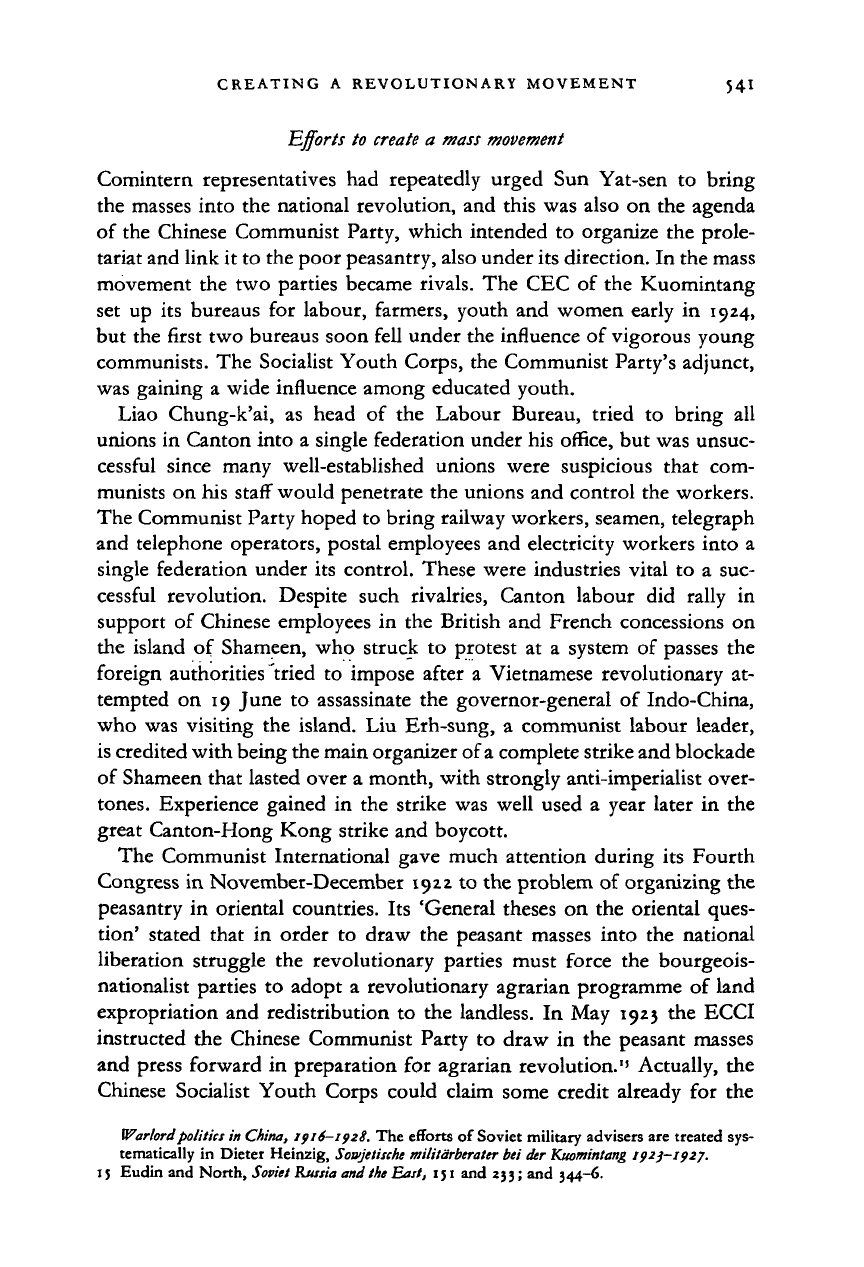
CREATING A REVOLUTIONARY MOVEMENT 541
Efforts
to
create
a
mass
movement
Comintern representatives
had
repeatedly urged
Sun
Yat-sen
to
bring
the masses into
the
national revolution,
and
this was also
on the
agenda
of the Chinese Communist Party, which intended
to
organize
the
prole-
tariat and link
it
to the poor peasantry, also under its direction.
In
the mass
movement
the two
parties became rivals.
The CEC of the
Kuomintang
set
up its
bureaus
for
labour, farmers, youth
and
women early
in 1924,
but
the
first two bureaus soon fell under the influence
of
vigorous young
communists.
The
Socialist Youth Corps,
the
Communist Party's adjunct,
was gaining
a
wide influence among educated youth.
Liao Chung-k'ai,
as
head
of the
Labour Bureau, tried
to
bring
all
unions
in
Canton into
a
single federation under his office,
but
was unsuc-
cessful since many well-established unions were suspicious that
com-
munists
on
his staff would penetrate
the
unions
and
control
the
workers.
The Communist Party hoped
to
bring railway workers, seamen, telegraph
and telephone operators, postal employees
and
electricity workers into
a
single federation under
its
control. These were industries vital
to a suc-
cessful revolution. Despite such rivalries, Canton labour
did
rally
in
support
of
Chinese employees
in the
British
and
French concessions
on
the island
of
Shameen,
who
struck
to
protest
at a
system
of
passes
the
foreign authorities tried
to
impose after
a
Vietnamese revolutionary
at-
tempted
on 19
June
to
assassinate
the
governor-general
of
Indo-China,
who
was
visiting
the
island.
Liu
Erh-sung,
a
communist labour leader,
is credited with being the main organizer of a complete strike and blockade
of Shameen that lasted over
a
month, with strongly anti-imperialist over-
tones.
Experience gained
in the
strike
was
well used
a
year later
in the
great Canton-Hong Kong strike
and
boycott.
The Communist International gave much attention during
its
Fourth
Congress
in
November-December 1922
to
the problem
of
organizing
the
peasantry
in
oriental countries.
Its
'General theses
on the
oriental ques-
tion' stated that
in
order
to
draw
the
peasant masses into
the
national
liberation struggle
the
revolutionary parties must force
the
bourgeois-
nationalist parties
to
adopt
a
revolutionary agrarian programme
of
land
expropriation
and
redistribution
to the
landless.
In
May 1923
the
ECCI
instructed
the
Chinese Communist Party
to
draw
in the
peasant masses
and press forward
in
preparation
for
agrarian revolution." Actually,
the
Chinese Socialist Youth Corps could claim some credit already
for the
Warlord politics in
China,
1916-1928. The efforts
of
Soviet military advisers are treated sys-
tematically
in
Dieter Heinzig,
Soojetisehe milittirberatcr
bti
der
Kuomintang
1923-1927.
15 Eudin
and
North, Soviet Russia
and
the East,
151 and
233;
and
344-6.
Cambridge Histories Online © Cambridge University Press, 2008
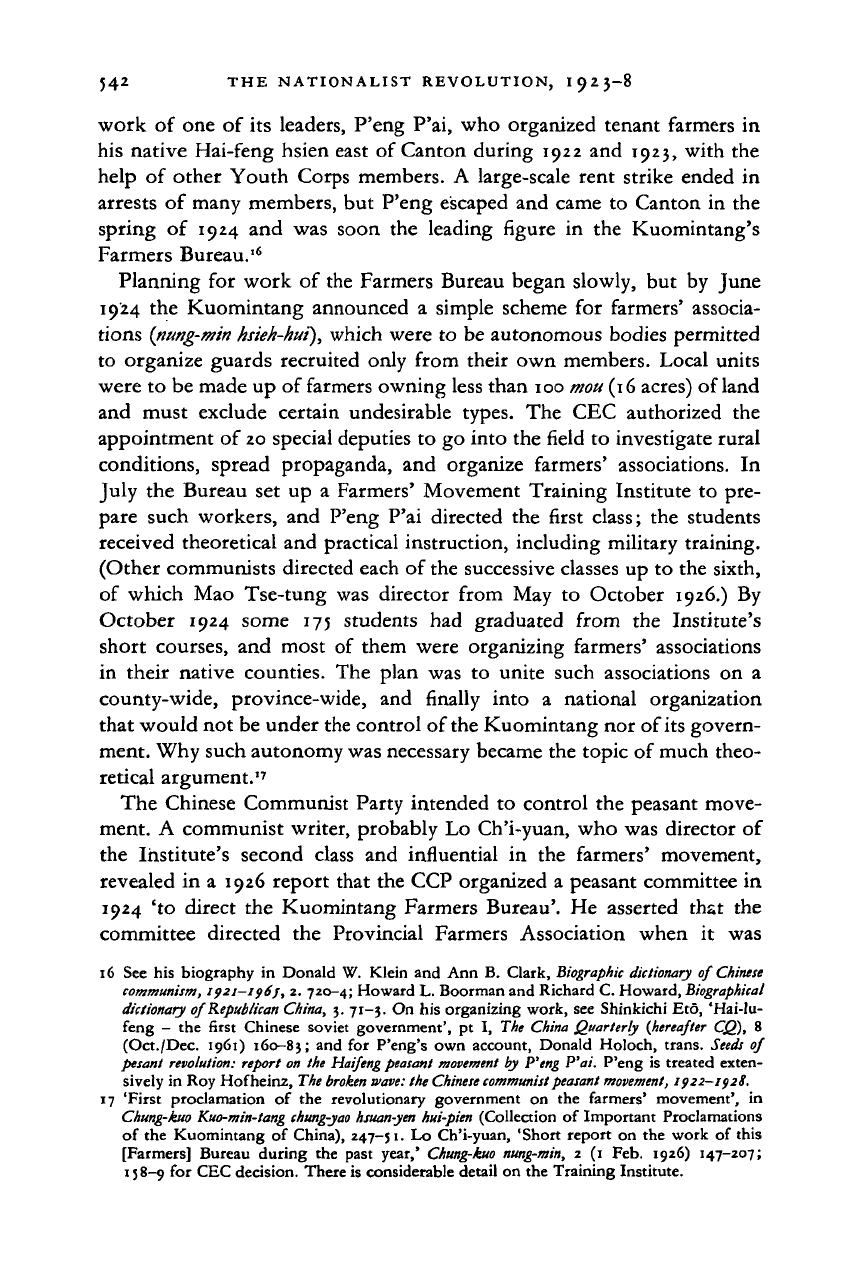
542 THE NATIONALIST REVOLUTION, I 9 2 3-8
work of one of its leaders, P'eng P'ai, who organized tenant farmers in
his native Hai-feng hsien east of Canton during 1922 and 1923, with the
help of other Youth Corps members. A large-scale rent strike ended in
arrests of many members, but P'eng escaped and came to Canton in the
spring of 1924 and was soon the leading figure in the Kuomintang's
Farmers Bureau.'
6
Planning for work of the Farmers Bureau began slowly, but by June
1924 the Kuomintang announced a simple scheme for farmers' associa-
tions
{nung-min
hsieh-hui),
which were to be autonomous bodies permitted
to organize guards recruited only from their own members. Local units
were to be made up of farmers owning less than 100
mou
(16 acres) of land
and must exclude certain undesirable types. The CEC authorized the
appointment of 20 special deputies to go into the field to investigate rural
conditions, spread propaganda, and organize farmers' associations. In
July the Bureau set up a Farmers' Movement Training Institute to pre-
pare such workers, and P'eng P'ai directed the first class; the students
received theoretical and practical instruction, including military training.
(Other communists directed each of the successive classes up to the sixth,
of which Mao Tse-tung was director from May to October 1926.) By
October 1924 some 175 students had graduated from the Institute's
short courses, and most of them were organizing farmers' associations
in their native counties. The plan was to unite such associations on a
county-wide, province-wide, and finally into a national organization
that would not be under the control of the Kuomintang nor of its govern-
ment. Why such autonomy was necessary became the topic of much theo-
retical argument.
17
The Chinese Communist Party intended to control the peasant move-
ment. A communist writer, probably Lo Ch'i-yuan, who was director of
the Institute's second class and influential in the farmers' movement,
revealed in a 1926 report that the CCP organized a peasant committee in
1924 'to direct the Kuomintang Farmers Bureau'. He asserted that the
committee directed the Provincial Farmers Association when it was
16 See his biography in Donald W. Klein and Ann B. Clark,
Biographic dictionary
of
Chinese
communism,
1921—196}, 2. 720-4; Howard L. Boorman and Richard C. Howard,
Biographical
dictionary of
Republican
China, 3. 71—}. On his organizing work, see Shinkichi Eto, 'Hai-lu-
feng - the first Chinese soviet government', pt I, The
China
Quarterly (hereafter CQ), 8
(Oct./Dec. 1961) 160-83;
a
°d f°
r
P'eng's own account, Donald Holoch, trans.
Seeds
of
pesant
revolution:
report on the
Haifeng peasant movement
by P'eng P'ai. P'eng is treated exten-
sively in Roy Hof heinz,
The broken
wave:
the Chinese
communist
peasant
movement,
1922-192!.
17 'First proclamation of the revolutionary government on the farmers' movement', in
Chung-kuo Kuo-min-tang chung-yao hsuan-yen hui-pien
(Collection of Important Proclamations
of the Kuomintang of China), 247-51. Lo Ch'i-yuan, 'Short report on the work of this
[Farmers] Bureau during the past year,'
Chung-kuo
nung-min,
2 (1 Feb. 1926) 147-207;
158-9 for CEC decision. There is considerable detail on the Training Institute.
Cambridge Histories Online © Cambridge University Press, 2008
